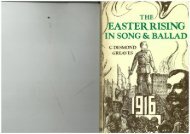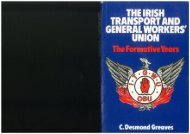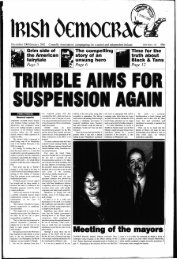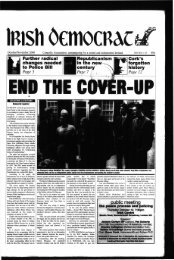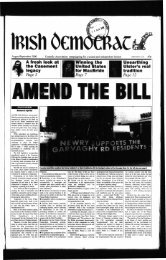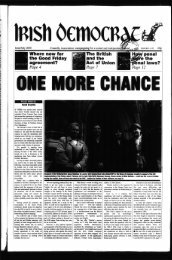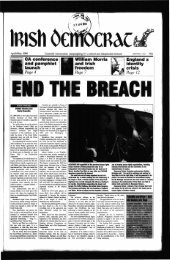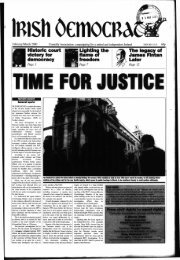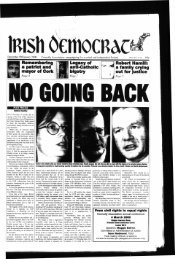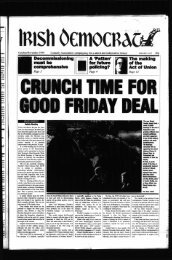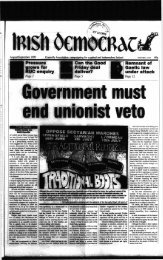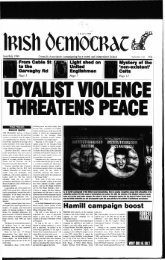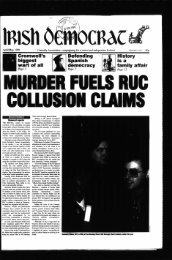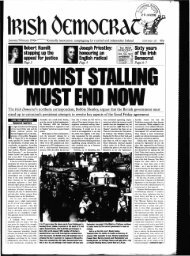Create successful ePaper yourself
Turn your PDF publications into a flip-book with our unique Google optimized e-Paper software.
Page Six IRISH DEMOCRAT <strong>March</strong> 1M7<br />
SHANTY IN OLD LONDON TOWN<br />
(To the an l Slatterv's Mounted F ul. this ballad b> Donal Kennedy<br />
eommemoraliN his exploits when water poured from the flat above<br />
into the l our Pro\inces Bookshop in January from a burst pipe, and<br />
the stopcock was in the cellar to which entrance — normally — is<br />
pained from the said flat.)<br />
C OMK all >e dauntless mariners who chum the ragin' surf<br />
And cross the Western ocean filled with Double X and turf,<br />
Whose lust\ youth was tamed by belles with Polynesian charms<br />
And who spliced a rake of mainbraces beyant in Calthorp's arms<br />
Whose sires of yore manned Erin's Hope and drove the Fenian Ram<br />
Whose mothers roved with Granuaile and didn't give a damn<br />
For Drake nor Rodney's Glory, nor for Faerie Queen nor King<br />
But for our own Four Provinces would high and proudly swing.<br />
Down rushed the Cataracts and Hurricanoes pounded<br />
Be Neptune and ver man MacLir the bookshop nearly dhrownded<br />
As some spake in divers tongues "tosnaimis ag snamh"<br />
There goes our Buntus Cainte stock, "a victim to the thaw."<br />
Then up spoke Gerry C urran, "Mates, how can we stop a rout?"<br />
(The people from the flat above being tee-totallv out)<br />
"As they control the cellar too, tis Manifestly plain<br />
We can't get to the stopcock 'less we launch a bould Campaign"<br />
Sez I, "Me boys, let's burglarise, with jemmy steps and saw.<br />
If they're consintin' adults, sure 'tis not agin' the Law.<br />
We'll add our share of lustre to the Epic of the Gael,<br />
\nd when we're back in drydock we can hold a 'damaged sale'."<br />
Down rushed the Cataracts and Murricanoes pounded<br />
Be Neptune and yer man MacLir the bookshop nearly dhrownded;<br />
We nailed our Colours to the mast, sang "We shall overcome"<br />
And foiled the lashing elements with burglary and rum.<br />
MONTO<br />
( I lie slang name lor Montgomery Street, the former red-light area of<br />
Dublin.)<br />
WI LL, if you've got a wing-o, take her vp to Ring-o<br />
Where the waxies sing-o all the day;<br />
If you've had your fill of porter and you can't go any futher<br />
Gixe your man the order, back to the quay!<br />
And take her up to Monto, Monto, Monto<br />
lake her up to Monto, langeroo - bum - bum to you!<br />
You've heard of the Duke of Gloucester, the dirty oul' imposter<br />
He got a mot and lost her up the Furry Glen)<br />
He first put on his bowler and he buttoned up his trousers<br />
And he whistled for a growler and he sqys "My man . . .<br />
lake me up to Monto, Monto, Monto<br />
Take me up to Monto, langeroo - bum - bum to you."<br />
When Carey told on Skin-the-Goat, O'Donnell caught him on the boat,<br />
He wished he'd never been afloat, the dirty skite;<br />
It wasn't very sensible to tell on the Invincibles<br />
They stood up for their principles day and night.<br />
And they all went up to Monto, Monto, Monto<br />
lake them up to Monto, langeroo - bum - bum to you!<br />
Now when the C /ar of Russia and the King of Prussia<br />
Landed in the Phoenix in a big balloon<br />
They asked the policemen to play the Wearing of the Green<br />
But the buggers in the depot didn't know the tune.<br />
So they both went up to Monto, Monto, Monto<br />
l ake them both to Monto, langeroo - bum - bum to you!<br />
Now Queen Vic she came to call on us, she wanted to see all of us<br />
I'm glad she didn't fall on us, she's eighteen stone,<br />
"Mister Melord Mayor sez she, is this all you've got to show to me?"<br />
"Why no, ma'am there's some more to see, pog mo thon!'<br />
And he took her up to Monto, Monto, Monto<br />
And he took her up to Monto, Langeroo - bum - bum to you!<br />
TORRAMH AN BHAIRILLE<br />
SCKOLFAD teastas ar shloite Bhaile Mhe Oda mhaisuil mhuintc -<br />
Treoirt do chleachtas gach lo gan lagahd orthu, ol gan cheasna gan chuinse;<br />
Lcouta lannamhar ceolmhar greanmhar eomhach tach calma cuntach,<br />
Is is mor ant-aiteas go deo hheith eatarthu ar thorramh an bhairille a dhiughh.<br />
Htor ni taiscithear ico go dearfa: in or na in earra ni chumhdaid,<br />
Ach mor chuid heathuisce is beoir in aisce gan speois dascaipeaddh ar an nduthaigh;<br />
An dearoil ma (hagann gan Ion 'na spaga do gheobhaidh an casca gan cuntas<br />
Lc hoi gan bacadh go bord na maidne ar thorramh an bhairille a dhuigadh.<br />
Kona dtearmainn deonach tarraingid foirne dalla gan suile<br />
°S is leor do bhacaigh gan treoir go tapaidb 'na dhoid gan bata go siulaid;<br />
Nil stroinse dcalbh on g ( obh go C aiseal na fos i ghfearantas Dhubhagain<br />
Nach seoltar sealed 'na gcombair i dtigh tabhairne ar thorrah an bhairille a<br />
dhilugadh.<br />
IRISH<br />
SONGS<br />
Edited by<br />
PATRICK BOND<br />
RODY<br />
McCORLEY<br />
HO! see the fleet-feet hosts of men<br />
Who speed with faces wan<br />
From farmstead and from fisher's cot<br />
L pon the banks of Bann!<br />
They come with vengeance in their<br />
eyes -<br />
Too late, too late are (hey -<br />
For Rod> McCorley goes to die.<br />
On the Bridge of Toome today.<br />
Oh. Ireland, Mother Ireland,<br />
Vou love them still the best.<br />
The fearless brave who fighting fall<br />
Upon your hapless breast;<br />
But never a one of all your dead<br />
More bravely fell in fray.<br />
Than he who marches to his fate,<br />
On the Bridge of Toome today.<br />
Up the narrow street he stepped.<br />
Smiling and proud and young;<br />
About the hemp rope on his neck<br />
The golden ringlets clung.<br />
There's never a tear in the blue, blue<br />
eyes,<br />
Both glad and bright are they<br />
As Rody McCorley goes to die,<br />
On the Bridge of Toome today.<br />
The grey coat and its sash of green<br />
Were brave and stainless then;<br />
A banner flash beneath the sun<br />
Over the marching men -<br />
The coat hath many a rent this noon<br />
The sash is torn away,<br />
And Rody McCorley goes to die,<br />
On the Bridge of Toome today.<br />
Oh, how his pike flashed to the sun!<br />
Then found a foeman's heart!<br />
Through furious fight, and heavy odds.<br />
He bore a true man's part;<br />
And many a rcd-coat hit the dust<br />
Before his keen pike-play;<br />
But Rody McCorley goes to die,<br />
On the Bridge of Toome today.<br />
Because he loved the Motherland,<br />
Because he loved the Green,<br />
He goes to meet the martyr's fate<br />
With proud and joyous mien,<br />
True to the last, true to the last,<br />
He treads the upward way -<br />
Young Rody McCorley goes to die<br />
On the Bridge of Toome today.<br />
WANT A<br />
SONG BOOK?<br />
Call to . . .<br />
FOUR PROVINCES<br />
BOOKSHOP<br />
246 GRAYS INN ROAD.<br />
LONDON,<br />
WC1<br />
Phone 833 3022<br />
ONLY OUR RIVERS RUN FREE<br />
WHEN apples still grow in November<br />
When blossoms still bloom from each tree<br />
When leaves are still green in December,<br />
It's then that our land will be free.<br />
I wander the hills and the valleys<br />
And still through my sorrow I see<br />
A land that has never known freedom<br />
And only her rivers run free.<br />
I drink to the death of her manhood<br />
Those men who'd rather have died<br />
Than live in the cold chains of bondage<br />
To bring back their rights were denied.<br />
Oh, where are you now that we need you,<br />
What burns where the flame used to be,<br />
Are you gone like the snow of last winter,<br />
And will only our rivers run free?<br />
How sweet is life, but we're crying,<br />
How mellow the wine, but we're dry;<br />
How fragrant the rose, but it's dying<br />
How gentle the wind, but it sights.<br />
What good is youth when its ageing,<br />
What joy is in eyes that can't see,<br />
When there's sorrow in sunshine and flowers<br />
And still only our rivers run free?<br />
- MICHAEL McCONNELL<br />
GREEN FIELDS OF FRANCE<br />
WELL how do you do young Willie McBride?<br />
Do you mind if I sit here down by your graveside?<br />
And rest for a while 'neath the warm summer sun,<br />
I've been walking all day and I'm nearly done.<br />
I see by your gravestone you were only nineteen<br />
When you joined the great fallen in 1916;<br />
I hope you died well and I hope you died clean,<br />
Or young Willie McBride was it slow and obscene?<br />
CHORUS:<br />
Did they beat the drums slowly, did they play the fife lowly<br />
Did they sound the "Death <strong>March</strong>" as they lowered you down,<br />
Did the band play "The Last Post and Chorus"?<br />
Did the pipes play "The Flowers of the Forest"?<br />
Did you leave e'er a wife or a sweetheart behind,<br />
In some faithful heart is your memory enshrined?<br />
Although you died back in 1916<br />
In that faithful heart are you forever nineteen?<br />
Or are you a stranger without even a name,<br />
Enshrined forever behind a glass frame<br />
In an old photograph torn, battered and stained<br />
And faded to yellow in a brown leather frame?<br />
The sun now it shines on the green fields of France<br />
The warm summer breeze makes the red poppies dance,<br />
And look how the sun shines from under the clouds<br />
There's no gas, no barbed wire, there's no gun firing now.<br />
But here in this graveyard it's still no-man's land,<br />
A thousand white crosses stand mute in the sand<br />
To man's blind indifference to his fellow man,<br />
To a whole generation that were butchered and damned.<br />
Ah young Willie McBride I can't help wonder why<br />
Did all those who died here know why did they die.<br />
And did they believe when they answered the call<br />
Did they really believe that this war would end wars?<br />
For the sorrow, the suffering, the glory, the pain,<br />
The killing and dying were all done in vain.<br />
For young Willie McBride it all happened again<br />
And again and again and again and again.<br />
ERIC BOGLF<br />
THE SPANISH LADY<br />
AS I came down through Dublin City<br />
At the hour of twelve at night.<br />
Who should I see but a Spanish lady<br />
Washing her feet by candlelight?<br />
First she washed them then she dried them<br />
Over a fire of amber coal -<br />
In all my life I ne'er did see<br />
A maid so neat about the sole.<br />
As 1 came back through Dublin City<br />
At the hour of half past eight<br />
Who should I see but a Spanish lady<br />
Brushing her hair in broad day light?<br />
First she tossed it, then she brushed it<br />
On her lap with a silver comb -<br />
In all my life I ne'er did see<br />
A maid so sweet since I did roam.<br />
As I came back through Dublin City<br />
When the sun began to set ,<br />
Who should I see but a Spanish lady<br />
Catching a moth in a golden net?<br />
When she saw me, then she fled me<br />
Lifting her petticoat over her k»ee -<br />
In all my life I ne'er did see<br />
A maid so blithe as the Spanish Ia4y.<br />
i<br />
<strong>March</strong> 1997<br />
From Kavanagb<br />
to Deane<br />
"The Faber Book of<br />
Contemporary <strong>Irish</strong><br />
Poetry". Edited by Paul<br />
Muldoon. Published by<br />
Faber. 416pp. Price £5.95.<br />
ESCHEWING the temptationto play<br />
safe and include just a couple of<br />
poems by countless poets, this careful<br />
and intelligent anthology provides<br />
instead a generous selection of the<br />
work of ten established poets.<br />
With predictably generous space<br />
devoted to both Patrick Kavanagh<br />
and Louis MacNeice, the collection<br />
continues with Thomas Kinselfa,<br />
John Montague, Michael Longley,<br />
Seamus Heaney, Derek Mahon, Paul<br />
Durcan, Tom Baulin and finally<br />
Medbh McGuckian.<br />
A short prologue precedes the<br />
poems: an extract from a discussion<br />
between F. R. Higgins and Louis<br />
MacNeice, broadcast in 1939. "<strong>Irish</strong><br />
poetry," stated Higgins, "remains a<br />
creation happily .fundamentally<br />
rooted in rural civilisation, yet aware<br />
of and in touch with the elementals of<br />
the future." This is most evidently<br />
true of the poetry of Patrick<br />
Kavanagh. Besides the complete<br />
rendering of "The Great Hunger",<br />
there are many Kavanagh poems here<br />
that bear witness to his startling<br />
originality.<br />
Heaney has said that Kavanagh<br />
"wrested.his idiom bare-handed out<br />
of a literary nowhere" and by<br />
anthology's end we can clearly see,<br />
Kavanagh's continuing influence on<br />
contemporary <strong>Irish</strong> poetry — not<br />
least on Seamus Heaney himself.<br />
MacNewe has hisiown particular<br />
view of • thfr poet — "a sensitive<br />
instrument designed • to record<br />
anything which interests his mind or<br />
afreets his emotions." Thfeselection of<br />
his work' certainty includes poems of<br />
such 'occasional' nature ('Snow' or<br />
The Brandy Glass') yet MacNeice<br />
speaks as warmly and tnovinglyas any<br />
about Ireland, as the extract from<br />
"Autumn Journal" shows.<br />
John Montague's accessible lyrics<br />
are in many ways reminiscent of<br />
Kavanagh's themes and, in thinking<br />
of themes, there is throughout a<br />
recurrence' of poems about fathers<br />
and, less often, motiiers, which makes<br />
an interesting sub-colIfcction of lyrics<br />
that teW fascinating stories of<br />
unhappier(lives..<br />
Heaney) surely the most popular of<br />
contemporary <strong>Irish</strong> poets, is well<br />
represented by poems spanning all his<br />
collection ending with an extract from<br />
the lengthy."Station Island."<br />
IRISH DEMOCRAT<br />
- irm<br />
Father and Son<br />
Celtic Knot work by Iain<br />
Bain, 112pp. £10.95.<br />
Published by Constable.<br />
THIS new book on Celtic knotwork is<br />
not the best, but it is an addition to a<br />
subject that is fast attracting the<br />
attention of artists and craftworkers<br />
who appreciate Celtic Art. Certainly<br />
the demand for the Celtic design<br />
greetings cards produced by the<br />
Northampton Connolly Association<br />
continues to grow with the interest in<br />
our design and printing workshops.<br />
But where did this beautiful<br />
intricate art form originate? Persian<br />
art is not dissimilar and we know that<br />
the first tribes to arrive in Ireland<br />
The Perversion of Science<br />
and Technology in Ireland.<br />
By Derry Kellcher. Price<br />
£2.50. pps/48 Justice<br />
Books.<br />
IN this excellent pamphlet Kellacher<br />
deplores the fact that scientists and<br />
technologists play a subordinate role<br />
to accountants and salesmen in<br />
industry. It was C. P. Snow who tried<br />
to alert western capitalism to the<br />
dangers of science and art becoming<br />
two alien cultures.<br />
The dominance of accountants and<br />
Stockbrokers over engineers and<br />
scientists in Britain is well known as is<br />
the disastrous neglect of British<br />
industry in favour of the City: Mrs<br />
Thatcher and Nigel Lawson have a<br />
marked preference for service<br />
industries and tourism while working<br />
class lads are crying out for<br />
engineering apprenticeships.<br />
Mr Kellacher points to the same<br />
tendencies in Ireland. He describes<br />
<strong>Irish</strong> cultural and political life as antiscientific.<br />
He claims that the-antiscientific<br />
temper of public life in both<br />
countries stem in the first place from<br />
British educational policy,—<br />
"designed to create a species of home<br />
and colonial administrators to occupy<br />
posts in the army, the judiciary, the<br />
civil service and the police."<br />
Kellacher criticises the Romantic<br />
poets for failing "to understand that<br />
Derek Mahon's illuminating poem<br />
"In darrowdore Churchyard; at the<br />
graveof Louis MacNeice" provides its<br />
own insights into the earlier poet's<br />
wodb- And- it - is - another- marked<br />
feature of tfceoolloetion,ibis constant<br />
intcr-fefeml ofc«h6pootty wilhpoems<br />
ubots,' wand far saofckxhert<br />
MMbh McOuckJM* makes an -<br />
interesting fiitaMnohiatori-asthe onlyfemale<br />
poet. Her work -^occasionally<br />
inspired by .diverse historical figures<br />
— teases and surprises.<br />
Having made the brave decision to<br />
stick out his neck and settle for just ten<br />
poets, Paul Muldoon has succeeded in<br />
selecting a coherent and provoking<br />
anthology.<br />
C.P.<br />
trom the middle east. Our<br />
forbears carved their brilliantly<br />
twined and twisted knots; plaits and<br />
key patterns in stone. Later on metals<br />
(gold and silver) jewels and<br />
parchment, demonstrated to fine<br />
effect in ancient illuminated<br />
manuscripts. The best examples are<br />
the Book of Kelts and the Book of<br />
Durrow in Trinity College, Dublin.<br />
For those interested in learning the<br />
art of how to plan and create grids,<br />
cells, knotwork and interlacing the<br />
best book is Celtic Art. the methods<br />
of contraction by George Bain. This<br />
book by the authors son is, as I said a<br />
useful addition to this fascinating<br />
subject.<br />
Peter Mulligan<br />
the better world they were seeking<br />
could only be realised through further<br />
developments in science and<br />
technology. Apart from Wordsworth<br />
who was a friend of the <strong>Irish</strong><br />
mathamatician Hamilton Rowen,<br />
Kellacher says "The Romantics were<br />
however, in the main stubbonly antiscientific<br />
in temper."<br />
The author quotes from a Dr R.<br />
Johnstone's article in Crane Bag to<br />
show the same tendencies existed even<br />
in the hedge schools where there was a<br />
leaning towards classical learning.<br />
Later in the same article Thomas<br />
Davis is castigated for ignoring the<br />
presence of scientists at a local<br />
meeting when he reported it in the<br />
Nation. Kellacher detects the same<br />
anti-scientific spirit even among those<br />
who opposed entry intothe European-<br />
Common Market. -<br />
This is such a complex subject that<br />
treatment in a small booklet only<br />
raises ten times as many questions as it<br />
has space to answer. Could the author<br />
not be induced to expand this<br />
important theme into a book of a<br />
hundred thousand words?<br />
The second 4 part of the booklet<br />
deals with Mr Kellacher's plans to<br />
convert power stations into<br />
generators not only of electricity but<br />
also for heat which could be used for<br />
adjacentcommunities: Could they not<br />
also supply hot water for baths and<br />
washing up in the summer? Popular<br />
support for such useful projects could<br />
I think force a change Of heart on the<br />
part of vested interests.<br />
G. Curran<br />
SUBSCRIPTION COUPON<br />
• Post to 244/246 GRAYS INN ROAD, WC1<br />
Please send) m* the "IRISH DEMOCRAT" each<br />
Name<br />
!, :<br />
Jl<br />
Address<br />
- ><br />
*i?<br />
K..<br />
! i . . . . . .<br />
monttrfor a year: I enclose-£5.<br />
m<br />
1»<br />
Some designs from the Book of Kelts.<br />
A man in the jaws of<br />
a beast. Two birds.<br />
The Jp symbol is on cheek and hip of the<br />
man. Note two right feet as in Egypttan<br />
Art.<br />
Page Seven<br />
Dr»wn by George Bain.<br />
"late XIV<br />
Plate XH.<br />
Actual width ',< inch Actua) ^dth |% jnches<br />
A man s heaa in a beast's mouth.<br />
The beast's hind legs and tail are<br />
at the foot of the pag*.<br />
A beast, head, top-knot, neck,<br />
foreleg, two hlndlegs and tail<br />
ERRORS LAID BARE<br />
Trial and Error. The Maguires<br />
The Guildford Pub Bombingv<br />
and British Justice. Robert Kee<br />
Hamish Hamilton. £10.95.<br />
READERS interested in a detailed<br />
and factual investigation of these<br />
cases can confidently be recommeded<br />
Robert Kee's book. <strong>Irish</strong> people owe a<br />
debt of gratitude to the author and<br />
also Ludovic Kennedy for their<br />
unstinting efforts to uncoverinjustice.<br />
So far thepressures have resulted in<br />
the Birmingham Six case being<br />
referred to the Court of Appeal, with<br />
results yet to be determined. It is to be<br />
hoped that the case wiU be heard with<br />
the minimum of delay.<br />
It is curious how doubt eventually<br />
filters through and in time possible<br />
errors of investigation and judicial<br />
approach are laid bare. A common<br />
feature is that the public rage at an<br />
event, condemned by all, pressurises<br />
the police to find culprits. From there,<br />
confessions form the basis of later<br />
conviction and as time goes on it<br />
becomes even more difficult to have<br />
the process reversed, as reputations<br />
become involved.<br />
girl<br />
Cuckoo by Linda Anderson,<br />
pp 160 (The Bodley Head £8.95).'<br />
SECOND novels are traditionally<br />
recognised as the most crucial<br />
moment in a writer's career,<br />
particularly in the wake of a successful<br />
start. Linda Anderson, whose first<br />
novel was short-listed for two prizes,<br />
presents us with a wide-ranging<br />
canvas as we follow the thoughts and<br />
actions of our heroine, Fran<br />
McDowell.<br />
Beginning in May 1982, we find<br />
Fran, a Belfast woman of Protestant<br />
background, starting to turn against<br />
the increasingly hostile world she<br />
inhabits. Pushed to the limits at work<br />
by her sexist boss,-she makes her ex.t<br />
with the memorable line, "If crass<br />
behaviour is linked to the menstrual<br />
cycle, how do you explain yours?"<br />
Moving into a kind of limbo<br />
without work or purpose (the least<br />
convincing part of the novel), Fran<br />
falls prey to a loud-mouthed West<br />
Indian. The resulting pregnancy<br />
succeeds in concentrating Fran's<br />
mind as she takes control of her life<br />
once more.<br />
It is here that the novel broadens and<br />
diversifies. What follows is always<br />
interesting, frank and readable, but<br />
one might have hoped for less<br />
•netadMOM than this latter half<br />
prodMM.-Noasthakw,'this is a writer<br />
to return to again.<br />
C.P.<br />
In the case of the Maguires much<br />
rested on the scientific tests for<br />
nitroglycerine. These tests have been<br />
devised by John Yallop who gave<br />
evidence for the defence. He said that<br />
in his view the substance on hands and<br />
gloves was not the explosive. The<br />
Judge, Mr Justice Donaldson, in his<br />
summing up said it would be quite<br />
unsafe to convict unless the jury were<br />
satisfied that the substance was<br />
nitroglycerine. In the circumstances,<br />
and bearing in mind the doubt since<br />
cast on the tests in question, it seems<br />
perverse not to reopen the case of the<br />
Maguires, or better still, to grant a free<br />
pardon. In the Guildford case, a<br />
convicted IRA man, Brendan Dowd,<br />
later confessed to the bombing and<br />
this exonerated those convicted for it.<br />
One can only hope that the<br />
Birmingham Six will be cleared and<br />
that continuing public pressure will<br />
lead to those other cases being<br />
reopened. That is the only way justice<br />
can be done to those convicted. The<br />
status of British justice would also<br />
benefit. As Robert Kee concludes:<br />
"Let Justice be done though the<br />
heavens fall." The heavens would^<br />
probably continue much as before but<br />
perhaps some reputations might not<br />
be quite the same.<br />
Dermot Htnes<br />
FIRE<br />
Biography of<br />
MARY Mac SWINEY<br />
By<br />
CHARLOTTE H. FALLON<br />
At<br />
Four Provinces<br />
Bookshop<br />
-t




